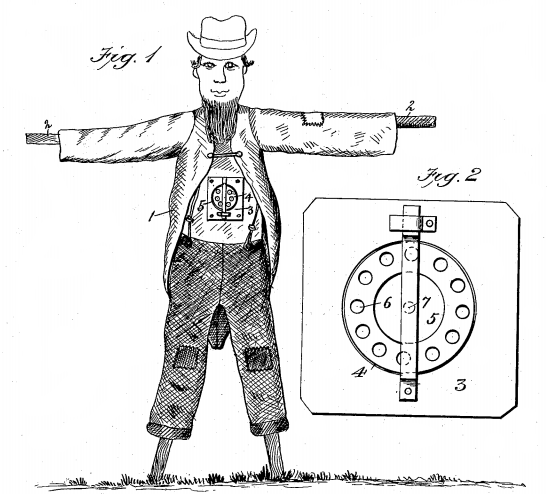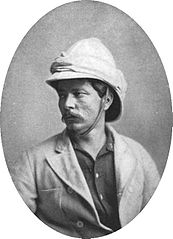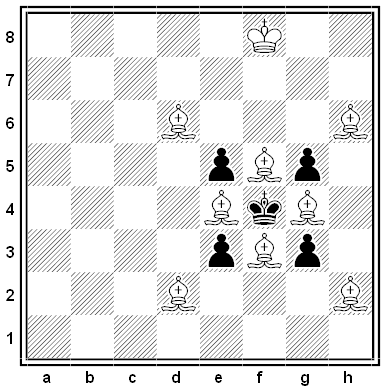On the floor of a room of area 5, you place 9 rugs. Each is an arbitrary shape but has area 1. Prove that there are two rugs that overlap by at least 1/9.
Author: Greg Ross
A Thief’s Welcome

Idaho farmer John Barnes patented this “coyote alarm” in 1903. Near his sheep pens he mounted a man-shaped scarecrow wearing a metal breastplate. In the breastplate was a cylinder “analogous to the cylinder of a revolver of large size” holding blank cartridges. A clockwork mechanism turned the cylinder, and a plunger dropped at intervals and fired a cartridge. Barnes would wind up the mechanism with a key at dusk, and the artificial farmer would fire its imaginary gun “every quarter of an hour throughout the night.” I wonder what the sheep thought of this.
This is actually less alarming than James Williams’ pest exterminator of 1882. That’s progress.
Namesakes

Sigourney Weaver was born Susan Weaver. She named herself Sigourney at 14, after a character mentioned briefly by Jordan Baker in The Great Gatsby:
She came over to me and whispered, ‘I’ve just heard the most surprising thing. Look, please come and see me. I’m staying at my aunt’s … Mrs. Sigourney Howard … phone book …’ She was hurrying away as she spoke, to join her friends who were waiting to drive her home.
“I was so tall,” Weaver told Time in 1986, “and Susan was such a short name. To my ear Sigourney was a stage name — long and curvy, with a musical ring.”
She couldn’t have known it at the time, but it appears that Fitzgerald intended Sigourney to be a man’s name: He had borrowed it from his friend Father Sigourney Fay, to whom This Side of Paradise is also dedicated.
“Jordan, it is clear, is here adopting the formal ‘English’ style of addressing her aunt by her husband’s name(s),” writes John Sutherland in Curiosities of Literature. “This was not just etiquette in the best circles; it was standard procedure in phone books of the 1920s. The husband paid the bills, and his was the name listed.”
Black and White
Have Gun

Welshman Henry Morton Stanley — famous for seeking explorer David Livingstone in Africa — fought on both sides in the American Civil War.
In April 1862, when just 21 years old, he fought in the Confederate Army’s 6th Arkansas infantry regiment at the Battle of Shiloh. Captured, he swore allegiance to the United States and joined the Union Army in June. He was discharged after two weeks’ service due to severe illness, but recovered and went on to join the U.S. Navy in 1864.
In The Galvanized Yankees, Dee Brown writes, Stanley “probably became the only man ever to serve in the Confederate Army, the Union Army, and the Union Navy.”
Reckoning
Two mathematicians were having dinner. One was complaining: ‘The average person is a mathematical idiot. People cannot do arithmetic correctly, cannot balance a checkbook, cannot calculate a tip, cannot do percents, …’ The other mathematician disagreed: ‘You’re exaggerating. People know all the math they need to know.’
Later in the dinner the complainer went to the men’s room. The other mathematician beckoned the waitress to his table and said, ‘The next time you come past our table, I am going to stop you and ask you a question. No matter what I say, I want you to answer by saying “x squared.”‘ She agreed. When the other mathematician returned, his companion said, ‘I’m tired of your complaining. I’m going to stop the next person who passes our table and ask him or her an elementary calculus question, and I bet the person can solve it.’ Soon the waitress came by and he asked: ‘Excuse me, Miss, but can you tell me what the integral of 2x with respect to x is?’ The waitress replied: ‘x squared.’ The mathematician said, ‘See!’ His friend said, ‘Oh … I guess you were right.’ And the waitress said, ‘Plus a constant.’
— Michael Stueben, Twenty Years Before the Blackboard, 1998
Piggyback

Between Grana and Casorzo, Italy, grows a cherry tree atop a mulberry tree.
It’s not uncommon for a small tree to grow on a larger one, but it’s rare for them to reach such a large size. The cherry even flowers in the spring.
The pair are known as the Bialbero de Casorzo, or “double tree of Casorzo.”
In a Word

cogitabund
adj. musing, meditating, thoughtful, deep in thought
In his Treatise of the System of the World, Isaac Newton imagines firing cannonballs with greater and greater velocity from a high mountaintop. “The body projected with a less velocity, describes the lesser arc VD, and with a greater velocity, the greater arc VE, and augmenting the velocity, it goes farther and farther to F and G; if the velocity was still more and more augmented, it would reach at last quite beyond the circumference of the Earth, and return to the mountain from which it was projected.”
Indeed, if air resistance is not a factor, the cannonball will return to the mountain with the same velocity with which it left it, “and retaining the same velocity, it will describe the same curve over and over, by the same law,” like the moon. Thus with a simple thought experiment Newton conceived that gravity was the key force underlying planetary motion.
In a fitting tribute, the diagram above is now traveling beyond the solar system on the Voyager Golden Record, on a journey that its author helped to make possible.
Comment
Whoever prepared the index for Desmond Ryan’s 1967 book The Fenian Chief: A Biography of James Stephens had a mordant sense of humor — it contains this entry:
O'Brien, An: never turns his back on an enemy, 32 would never retreat from fields in which ancestors were kings, 33 does, 34
Roaring Blazes
For his 1991 film Backdraft, director Ron Howard wanted fire to have a “brain,” like the shark in Jaws. So sound designer Gary Rydstrom added animal growls and howls to the sound of the flames. “You don’t hear them as animal sounds, but subconsciously it gives it an intelligence or a complexity it wouldn’t normally have.”
“For the suck in of air we used coyote howls. It wasn’t just a simple wind — it was more intelligent.”
“A lot of the fireball explosions were sweetened with monkey screams and different animal growls. Cougars make a great fire explosion sweetener. There’s a complexity to natural sounds, especially animal sounds, that is really wonderful.”
(From Vincent LoBrutto, Sound-on-Film, 1994.)

